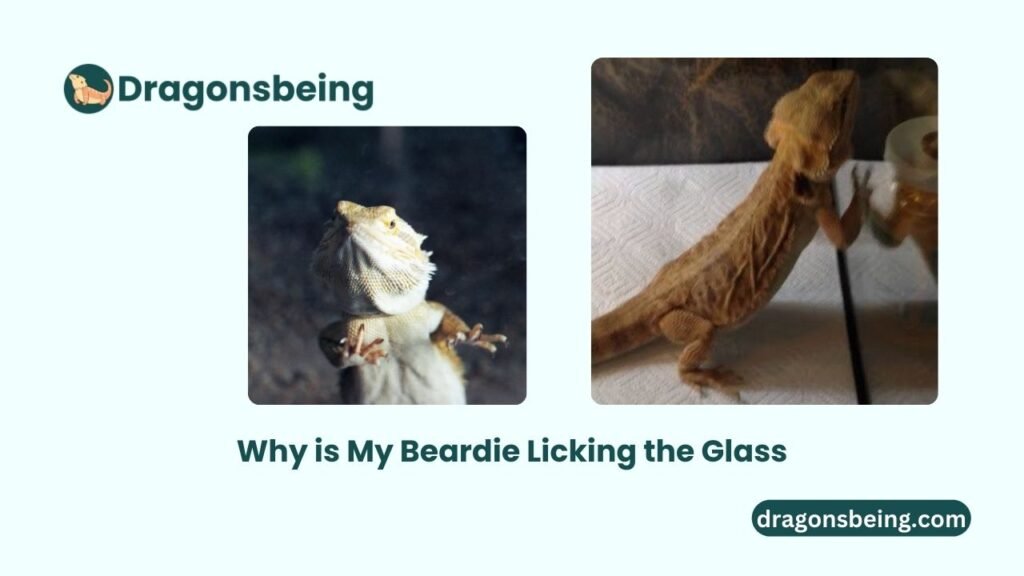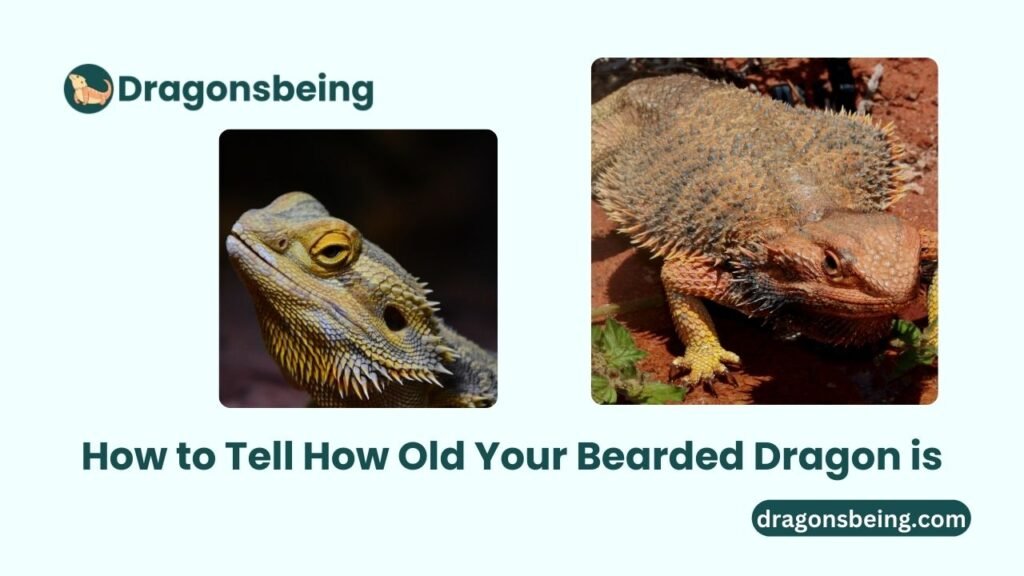Bearded dragons lick the glass to explore their environment or due to stress. They may also be trying to communicate their need for more space or stimulation.
Bearded dragons, or beardies, are curious reptiles that often engage in interesting behaviors. One common action is glass licking, which can puzzle many owners. Understanding this behavior is essential for ensuring your pet’s well-being. Glass licking can signal various needs, from curiosity about their surroundings to potential stress factors in their habitat.
Proper care and environment setup can help reduce this behavior. Regular interaction and enrichment can keep your beardie happy and engaged. Observing your reptile’s actions can lead to better insights into their needs, improving their overall quality of life.
Introduction To Beardie Behavior
Understanding your Bearded Dragon’s behavior is essential. Their actions reveal their needs and feelings. One curious behavior is licking the glass. This can signal various things. Let’s explore why they do this.
Beardies In The Wild
In their natural habitat, Bearded Dragons show interesting behaviors. They are curious creatures. Here are some key points about their wild habits:
- Territorial markings: Beardies lick surfaces to claim territory.
- Exploration: They use their tongues to gather information.
- Hunting: Licking helps them detect prey scents.
This behavior is instinctual. It helps them survive in the wild.
Common Household Behaviors
In a home setting, Beardies adapt their behaviors. Licking the glass is one of these actions. Here are common reasons they do it:
- Curiosity: They explore their environment by tasting.
- Stress: Glass licking can signal anxiety or boredom.
- Temperature: They may be seeking warmth from the glass.
- Attention: Licking can be a way to get noticed.
Understanding these reasons helps in providing better care. Observing your Beardie closely is key.
Decoding Glass Licking
Have you noticed your bearded dragon licking the glass? This behavior often puzzles owners. Understanding why they do this can enhance their care.
Exploring New Surroundings
Bearded dragons are naturally curious creatures. They explore their environment constantly. Licking the glass allows them to:
- Gather information about their surroundings.
- Detect scents in their habitat.
- Understand the layout of their enclosure.
New items or changes in their tank can trigger this behavior. Your beardie is simply investigating its space.
Seeking Attention
Bearded dragons may lick glass to get your attention. They crave interaction and stimulation. Here are some signs your beardie wants to engage:
- Head bobbing.
- Waving their arms.
- Bright color changes.
Glass licking can signal boredom too. Make sure to provide:
- Toys for stimulation.
- Climbing structures.
- Hiding spots.
Engaging your beardie reduces glass licking. It promotes a happier, healthier pet.
Health Concerns Linked To Glass Licking
Bearded dragons often lick glass for various reasons. Sometimes, it signals health concerns. Understanding these can help you care for your pet better.
Signs Of Stress
Stress can cause your beardie to lick the glass. Look for these signs:
- Excessive glass licking
- Hiding or retreating
- Loss of appetite
- Rapid breathing
- Tail twitching
Identify stressors in the environment. Common stressors include:
- Overcrowding in the habitat
- Sudden temperature changes
- Loud noises
Addressing these issues can reduce stress. A calm environment helps your beardie feel secure.
Potential Nutritional Deficiencies
Nutritional deficiencies may lead to glass licking. Bearded dragons need a balanced diet. Lack of essential nutrients can cause problems.
Common nutritional deficiencies include:
- Calcium deficiency
- Vitamin D3 deficiency
- Vitamin A deficiency
Signs of these deficiencies may include:
| Nutrient | Symptoms |
|---|---|
| Calcium | Weak bones, lethargy |
| Vitamin D3 | Poor bone development |
| Vitamin A | Skin problems, eye issues |
Ensure a varied diet. Include leafy greens, insects, and supplements. Regular vet check-ups help maintain health.
Environmental Factors
Bearded dragons often lick glass due to environmental factors. High temperatures, lack of humidity, or insufficient hiding spots can trigger this behavior. Ensuring a comfortable habitat helps reduce glass licking and promotes overall well-being for your pet.
Bearded dragons often lick the glass of their terrarium. This behavior can signal various environmental issues. Understanding these factors is vital for your pet’s health.
Terrarium Size And Setup
The size and setup of a terrarium greatly affect your beardie’s behavior. A small or cramped space can lead to stress.
- Ensure the terrarium is at least 40 gallons.
- Include hiding spots and climbing areas.
- Use materials that mimic their natural habitat.
A poorly designed terrarium can cause your beardie to feel trapped. This may lead to excessive glass licking as they seek escape.
Temperature And Humidity Levels
Proper temperature and humidity levels are crucial for a healthy beardie. Incorrect settings can cause discomfort.
| Parameter | Ideal Range |
|---|---|
| Temperature (Basking Spot) | 95°F to 105°F |
| Temperature (Cool Side) | 75°F to 85°F |
| Humidity | 30% to 40% |
Check your thermometer and hygrometer regularly. Improper levels can lead to stress and glass licking.
Dietary Influences
Your bearded dragon may lick the glass for various reasons. One major reason is related to its diet. A poor diet can lead to health issues. This can make your pet feel uncomfortable. Understanding dietary influences can help you address this behavior.
Importance Of A Balanced Diet
A balanced diet is crucial for your beardie’s health. It helps maintain energy levels and overall wellbeing. A proper diet includes:
- Leafy greens like kale and collard greens
- Vegetables such as squash and bell peppers
- Protein sources like crickets and mealworms
All these foods provide essential vitamins and minerals. A lack of proper nutrition can lead to stress. Stress may cause your beardie to lick the glass.
Supplements And Hydration
Supplements play a vital role in your beardie’s diet. Calcium and vitamin D3 are important for bone health. Without these, your beardie may feel weak. This can lead to licking behavior.
| Supplement | Purpose |
|---|---|
| Calcium | Supports bone strength and prevents metabolic bone disease. |
| Vitamin D3 | Helps with calcium absorption. |
Hydration is equally important. Bearded dragons need fresh water daily. Dehydration can make them feel uncomfortable. This discomfort may cause them to lick the glass.
Behavioral Enrichment Strategies
Bearded dragons need mental and physical stimulation. Licking the glass often signals boredom. Implementing behavioral enrichment strategies can help. These strategies enhance their environment and well-being.
Interactive Toys
Interactive toys stimulate your beardie’s curiosity and playfulness. Here are some great options:
- Hiding Treats: Use a puzzle feeder. Hide veggies or insects inside.
- Ball Toys: Use soft balls for them to nudge around.
- Climbing Structures: Add branches or ramps for climbing fun.
Rotate toys regularly to keep things exciting. Observe your beardie’s preferences. This encourages exploration and reduces glass licking.
Regular Handling And Interaction
Frequent handling strengthens your bond. It also reduces stress. Here are some tips:
- Daily Interaction: Spend 15-30 minutes each day.
- Gentle Handling: Support their body when picking them up.
- Outdoor Time: Supervise them in a safe outdoor space.
Handling helps your beardie feel secure. This can decrease glass licking behavior. Consistent interaction is key.
When To Consult A Veterinarian
Understanding your Bearded Dragon’s behavior is crucial. Licking the glass can signal different issues. Knowing when to seek veterinary help is essential for your pet’s health.
Persistent Behavior
If your Beardie licks the glass often, monitor the pattern. A few days of licking is common. However, continuous licking may indicate problems. Consider these points:
- Duration: Has it lasted over a week?
- Frequency: Is it happening multiple times daily?
- Environment: Is your Beardie stressed or bored?
Persistent licking suggests discomfort or distress. It’s wise to consult a vet if this behavior continues.
Signs Of Illness
Look for other symptoms alongside glass licking. These signs may indicate health issues:
| Symptom | Possible Illness |
|---|---|
| Loss of appetite | Digestive problems |
| Weight loss | Metabolic disorders |
| Lethargy | Infection or disease |
| Abnormal droppings | Intestinal issues |
Seek veterinary help if your Beardie shows any of these signs. Early diagnosis helps ensure a better outcome.
Frequently Asked Questions
Why Does My Beardie Lick The Glass?
Bearded dragons often lick glass to explore their environment and investigate reflections.
Is Glass Licking A Sign Of Stress?
Not necessarily. Glass licking can indicate curiosity, but it may also signal stress if combined with other behaviors.
How Can I Stop My Beardie From Licking?
Provide more enrichment and hiding spots in their habitat to keep them engaged and reduce glass licking.
Does Glass Licking Mean My Beardie Is Hungry?
Not usually. Glass licking is more about exploration than hunger. Ensure they have a balanced diet.
Is Glass Licking Harmful To My Beardie?
Occasional glass licking is generally harmless, but constant licking can lead to dehydration or irritation.
What Can I Do To Enrich My Beardie’s Environment?
Introduce climbing structures, hiding spots, and interactive toys to stimulate your Beardie’s natural behaviors.
Conclusion
Bearded dragons licking the glass can signal various needs or behaviors. It’s essential to observe their environment and health. Ensuring proper habitat conditions can reduce this behavior. Understanding your beardie’s actions strengthens your bond. Always prioritize their comfort and well-being for a happy, healthy pet.
Keep exploring to learn more about their needs!

Hi, I’m Dr. Michelle Mayers, a veterinary professional with a deep passion for animal health and well-being. Over the years, I’ve dedicated my life to caring for animals and helping pet owners better understand their furry, feathered, or scaly companions. On my blog, Dragonsbeing, I share insights, tips, and stories that aim to educate, inspire, and connect with fellow animal lovers. Join me at Dragonsbeing as we explore the fascinating world of veterinary care and celebrate the special bond between humans and animals!


